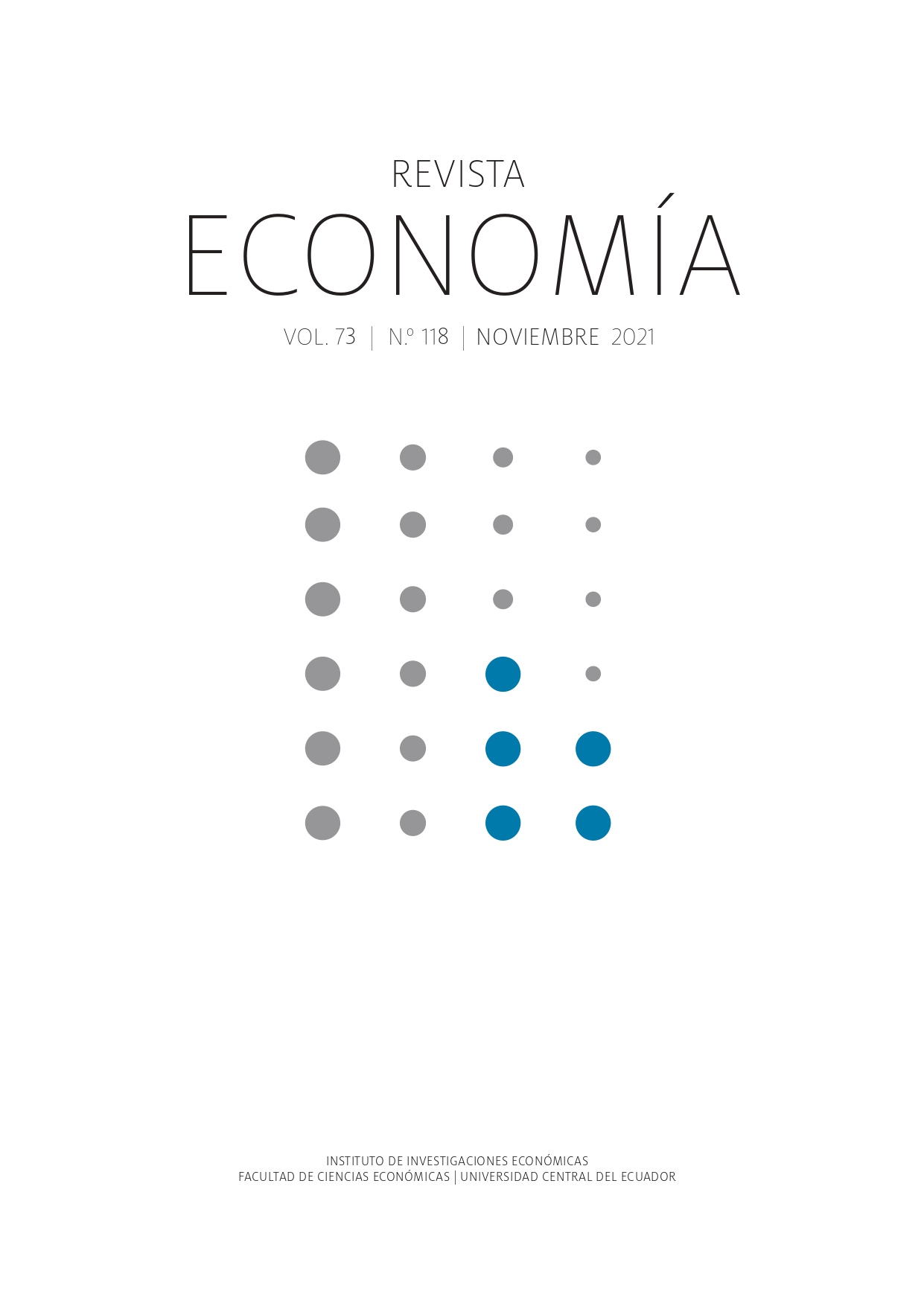Relations between Covid-19, sexism and racism in Brazil An analysis from the feminist economy
Main Article Content
Abstract
The pandemic particularly affects women, given the increase in unpaid domestic work unevenly distributed and the large race and gender gaps that characterize the labor market. The main aim of this paper is to think about the potential effects that the crisis may have on the lives of women in Brazil, especially racialized women, based on the empirical study of the two dimensions already mentioned: unpaid domestic and care work and labor market. This analysis will be carried out based on the microdata published by the Brazilian household survey (“PNADC”) in 2019 and 2020.
Downloads
Article Details

This work is licensed under a Creative Commons Attribution-NonCommercial 4.0 International License.
The authors who publish in this journal accept the following conditions:
- The authors retain the copyright and assign to the Economics Magazine the right of the first publication, with the work registered under Creative Commons Attribution-NonCommercial 4.0, which enables third parties to redistribute, commercial or non-commercial, of what has been published as long as the article circulates completely and without changes.
- Authors can make other independent and additional contractual agreements for the distribution of the article published in this journal (for example, add it to an institutional repository or publish it in a book) as long as they clearly and clearly specify that the article was published for the first time. once in Revista Economía. In case of reproduction, a note similar to the one presented below must be included: This text was originally published in the Revista Economía No.…, volume…, number of pages, year of publication.
- Authors are suggested to publish their work on the internet (for example, on institutional or personal pages) of the final version published by Revista Economía since this can lead to greater and faster dissemination of the published article.
References
Ballestrin, L. (2020). Feminismo de(s)colonial como feminismo subalterno latinoamericano. Revista Estudos Feministas, 28.
Bhattacharya, T. (2013). O que é a teoria da reprodução social. Socialist Worker, 10/09/2013 (trad. Renata Vereza).
Carrasco, C. (2006). La economía feminista: una apuesta por otra. Estudios sobre género y economía, 15, 29-62.
Davis, A. (1982). Women, race and class: an activist perspective. Women’s Studies Quarterly, 10(4), 5.
Enríquez, C. R. (2019). Trabajo de cuidados y trabajo asalariado: desarmando nudos de reproducción de desigualdad. Theomai, (39), 78-99.
Federici, S. (2012). Revolution at point zero: housework. Reproduction and Feminist Struggle, PM Press.
Fernández, B. P. M. (2019). Teto de vidro, piso pegajoso e desigualdade de gênero no mercado de trabalho brasileiro à luz da economia feminista: por que as iniquidades persistem? Cadernos de Campo: Revista de Ciências Sociais, (26), 79-104.
Folbre, N. (2006). Measuring care: Gender, empowerment, and the care economy. Journal of human development, 7(2), 183-199.
Fórum Brasileiro de Segurança Pública (2021). Visível e invisível: a vitimização de mulheres no Brasil, 3eira edição. Brasília: Fórum Brasileiro de Segurança Pública. https://forumseguranca.org.br/wp-content/uploads/2021/06/relatorio-visivel-e-invisivel-3ed-2021-v3.pdf
Furno, J. C. (2016). A longa abolição no Brasil: Transformações recentes no trabalho doméstico1. Revista Pesquisa & Debate. São Paulo, 27(2), 50.
González, L. (2019). Racismo e sexismo na cultura brasileira. In Hollanda, Heloisa Buarque de (Org.). Pensamento feminista brasileiro – formação e contexto. Rio de Janeiro: Bazar do Tempo, 237-256
Grosfoguel, R. (2008). Para descolonizar os estudos de economia política e os estudos pós-coloniais: transmodernidade, pensamento de fronteira e colonialidade global. Revista crítica de ciências sociais, (80), 115-147.
IBGE (Instituto Brasileiro de Geografia e Estatistica). (2020). Pesquisa Nacional por Amostra de Domicílios Contínua Anual, 2019. IBGE.
IBGE (Instituto Brasileiro de Geografia e Estatistica). (2021). Pesquisa Nacional por Amostra de Domicílios Contínua Anual, 2020. IBGE.
Lugones, M. (2010). Toward a decolonial feminism. Hypatia, 25(4), 742-759.
Marçal, K. (2016). ¿Quién le hacía la cena a Adam Smith?: una historia de las mujeres y la economía. Debate.
Olivera, M, Vieira, C. e Baeta, F. (2021). Mulheres no mercado de trabalho brasileiro: uma análise das segregações e discriminações a partir da economia feminista. td Instituto de Economia 021. ie/ufrj
Olivera, M., Podcameni, M. G., Lustosa M. C. e Graça, L. (2021). A dimensão de gênero no big push para a sustentabilidade no Brasil: as mulheres no contexto da transformação social e ecológica da economia brasileira, Documentos de Projetos (lc/ts.2021/6; lc/brs/ts.2021/1), Santiago e São Paulo, Comissão Econômica para a América Latina e o Caribe e Fundação Friedrich Ebert Stiftung.
Pérez Orozco, A. (2014). Subversión feminista de la economía. Aportes para un debate sobre el conflicto capital-vida. Traficantes de sueños.
Rich, A. (2010). Heterossexualidade compulsória e existência lésbica. Bagoas-Estudos gays: gêneros e sexualidades, 4(05).
Saffioti, H. (2013). A mulher na sociedade de classes: mito e realidade. Expressão Popular.

